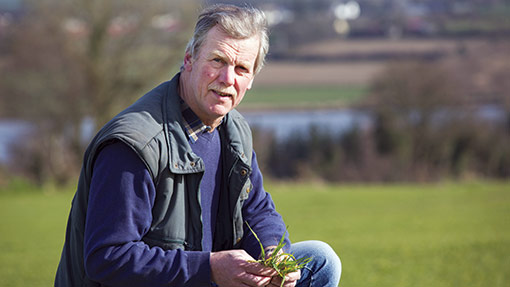Farmer Focus: August showers hit spring crops

We started harvest here on 21 July, which is our earliest start for many years. The weather was terrific and Volume winter barley was coming off at 8.6t/ha at 14.5% moisture, which is unusual, but satisfying for this part of the world.
Straw was baled the next day and all lifted by neighbouring livestock farmers. Happy days! However, weather wise it has been all downhill since then, with constant heavy showers. Combining has been a stop-start affair and only by working until 5am one morning did I manage to get my oilseed rape in at 12%. At least it managed an acceptable 4.35t/ha. Saffron completed the winter barley at 8.4t, but at 19% moisture content.
I said previously that I hoped my lovely field of spring oats stayed upright until harvest. Well, it won our local oats competition, but before the NI final was judged, we had a “Black Sunday” and now most of it is flat – despite growth regulators. I think a lot of patience will be required to get them harvested.
A lot of spring barley here has also gone down, which is most frustrating, as crops were looking good. If I hear another weather forecaster or journalist talking about heatwaves and a lovely summer, GBH is likely to be committed. Now winter oats and wheat will come ready at much the same time, so we desperately need a settled spell of weather.
However, harvesting has been made a lot easier and much less stressful by my purchase last year of a new combine. This came about because our main Massey Ferguson dealer suddenly announced he would no longer give me backup on my existing Massey machine, as I had not bought it from him.
This was a strange decision given that he had serviced and repaired it in previous years. What a lucky firm to be able to afford to turn away regular business. New Holland came to the rescue and a sophisticated CX5090 duly arrived and has been a pleasure to work with. Massey Ferguson’s loss was New Holland’s gain, so I guess the tractors will now also turn blue.
Robert Moore farms on the Molenan Estate in Northern Ireland, where his family have farmed for more than 200 years. He switched to arable production in the late 1990s, away from beef and sheep. He still has a small suckler herd on unsuitable arable land.

